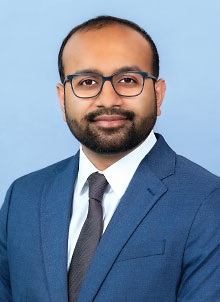Community Psychiatrist Brings Awareness of Inequity to Work as White House Fellow
Abstract
Sunny Patel, M.D., M.P.H., credits APA for helping to shape his career trajectory through a number of its programs.
When psychiatrist Sunny Patel, M.D., M.P.H., was growing up as a child in Maharashrta, a state in the western region of India, he lived in a building that abutted a slum.
“On one side we were pretty middle class, but on the other side of the wall was a slum,” he recalled. “If I made a left, I was in the slum. If I made a right, it went to the elementary school I attended with the other middle-class kids.”

“This is a unique opportunity to work with the federal government at the highest level with senior White House officials and learn how policymaking works and how the federal government impacts the lives of people,” says Sunny Patel, M.D., M.P.H.
It was a stark division that has stayed with him. “I remember thinking even then as a child—why do I go to school but the kids on the other side of the wall, in the slum, play in the streets?”
That same acute awareness of haves and have-nots followed him to the United States, when he and his family emigrated to a middle-class suburb of Chicago. He brought with him the idealized vision of a country where opportunity is open to all.
“I had a fantasy of America as a place of walking escalators”—everyone on the move and moving up. And sure enough, when he landed at O’Hare airport, there he was on the airport’s walking escalator, with the flashing lights overhead, moving from the arrival gates to the terminal.
“I thought, I’ve arrived.”
Reality intruded upon the fantasy. “The complexity of the American experience struck me pretty early on,” Patel said. “The America I saw didn’t match the fantasy. I kept grappling with the question, Why does inequality and inequity exist? Why do I have, and others don’t have?”
Today, Patel is bringing that formative awareness to the federal Department of Homeland Security (DHS), where he is working as a White House fellow with DHS Secretary Alejandro Mayorkas on immigration issues. He was appointed to the fellowship by President Joseph Biden last October.
The prestigious White House Fellowship embeds professionals from diverse backgrounds for a year as a full-time, paid fellow for White House staff, cabinet secretaries, and other senior government officials. (One notable graduate of the fellowship program is the late Colin Powell.)
President Lyndon B. Johnson created the White House Fellowship in 1964. The mission of the fellowship is to encourage active citizenship and service to the country. Throughout the year, fellows participate in an education program that expands their knowledge of leadership, policymaking, and contemporary issues. The fellowship is a nonpartisan program that has been maintained throughout Republican and Democratic administrations.
To his work at DHS, Patel carries with him an impressive background in general medicine, child and adolescent psychiatry, community psychiatry, and global health. He graduated from the University of California, Los Angeles, at age 19 and entered medical school at the Mayo Clinic thinking he would become a cardiac electrophysiologist. But at Mayo, he met three psychiatrists whom he credits as mentors—Michael Bostwick, M.D., Cosima Swintak, M.D., and Brian Palmer, M.D., M.P.H.
“I really liked the way they interacted with patients,” Patel said. Together they convinced him that psychiatry was where he could find a home for working with patients and communities and for his interest in public health and health disparities.
He completed his residency at Cambridge Health Alliance (CHA) at Harvard Medical School and a fellowship in child and adolescent psychiatry at New York University (NYU), where he created a model embedding mental health services in the pediatric oncology clinic. He spent the past decade working with refugee populations and has conducted forensic psychological examinations for asylum seekers with NYU and Physicians for Human Rights. During the COVID-19 pandemic, he launched a comprehensive mental health response for thousands of frontline workers and volunteered as a palliative care physician at Bellevue Hospital.
Mentors included J. Wesley Boyd, M.D., Ph.D., and Amber Frank, M.D., at CHA; and K. Ron-Li Liaw, M.D., and Jenny Havens, M.D., at NYU.
Patel also credits APA for shaping his career trajectory through several travel grants to attend the Annual Meeting and his participation in the APA Medical Student Elective in HIV Psychiatry. The program was established in 2004 to foster the participation of fourth-year medical students (particularly students from racial and ethnic minorities) in HIV-related care and research and provide them with essential HIV-related mental health training through an integrated approach to patient care. He was also an APA Diversity Leadership Fellow and served for a term on the APA Council on International Psychiatry.
Patel noted that the White House Fellowship was designed from the beginning as a way to open the mysteries of federal policymaking to leaders in diverse fields who can bring that knowledge back to their own communities. He said, “This is a unique opportunity to work with the federal government at the highest level with senior White House officials and learn how policymaking works and how the federal government impacts the lives of people. It creates a community of people who are like-minded in their devotion to their communities and to public service.” ■



